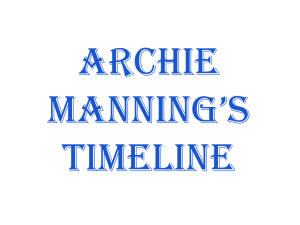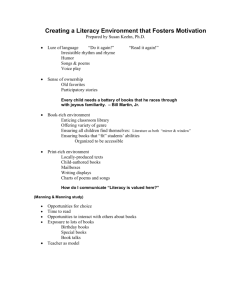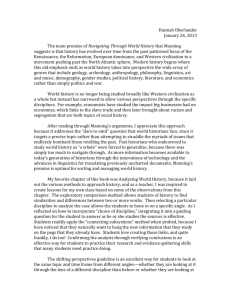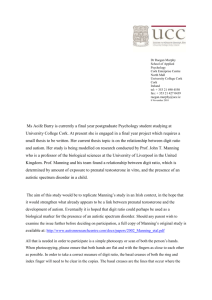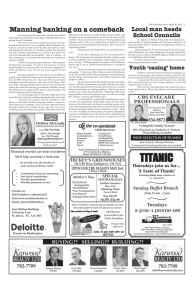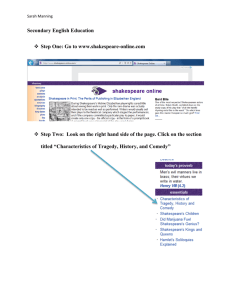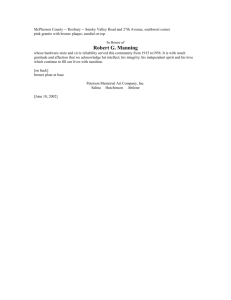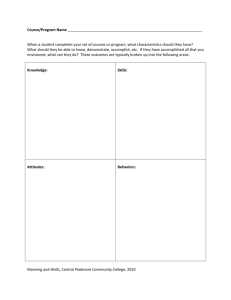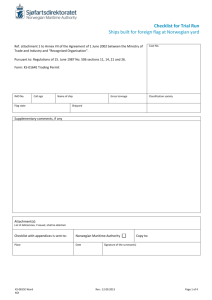Father's Love
advertisement
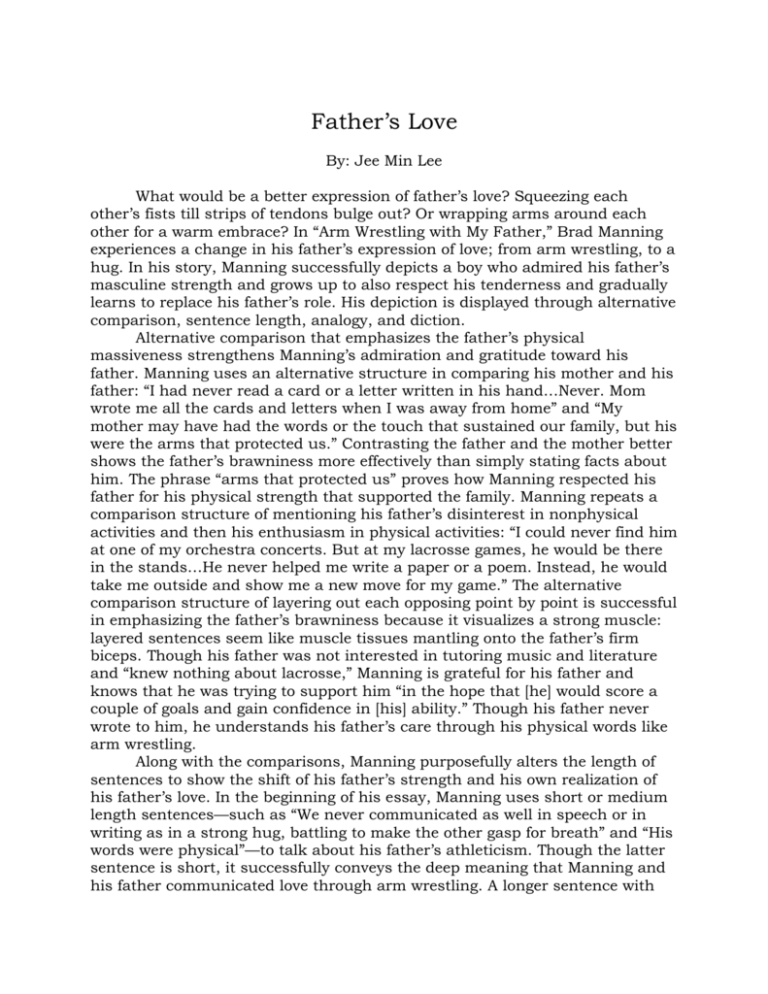
Father’s Love By: Jee Min Lee What would be a better expression of father’s love? Squeezing each other’s fists till strips of tendons bulge out? Or wrapping arms around each other for a warm embrace? In “Arm Wrestling with My Father,” Brad Manning experiences a change in his father’s expression of love; from arm wrestling, to a hug. In his story, Manning successfully depicts a boy who admired his father’s masculine strength and grows up to also respect his tenderness and gradually learns to replace his father’s role. His depiction is displayed through alternative comparison, sentence length, analogy, and diction. Alternative comparison that emphasizes the father’s physical massiveness strengthens Manning’s admiration and gratitude toward his father. Manning uses an alternative structure in comparing his mother and his father: “I had never read a card or a letter written in his hand…Never. Mom wrote me all the cards and letters when I was away from home” and “My mother may have had the words or the touch that sustained our family, but his were the arms that protected us.” Contrasting the father and the mother better shows the father’s brawniness more effectively than simply stating facts about him. The phrase “arms that protected us” proves how Manning respected his father for his physical strength that supported the family. Manning repeats a comparison structure of mentioning his father’s disinterest in nonphysical activities and then his enthusiasm in physical activities: “I could never find him at one of my orchestra concerts. But at my lacrosse games, he would be there in the stands…He never helped me write a paper or a poem. Instead, he would take me outside and show me a new move for my game.” The alternative comparison structure of layering out each opposing point by point is successful in emphasizing the father’s brawniness because it visualizes a strong muscle: layered sentences seem like muscle tissues mantling onto the father’s firm biceps. Though his father was not interested in tutoring music and literature and “knew nothing about lacrosse,” Manning is grateful for his father and knows that he was trying to support him “in the hope that [he] would score a couple of goals and gain confidence in [his] ability.” Though his father never wrote to him, he understands his father’s care through his physical words like arm wrestling. Along with the comparisons, Manning purposefully alters the length of sentences to show the shift of his father’s strength and his own realization of his father’s love. In the beginning of his essay, Manning uses short or medium length sentences—such as “We never communicated as well in speech or in writing as in a strong hug, battling to make the other gasp for breath” and “His words were physical”—to talk about his father’s athleticism. Though the latter sentence is short, it successfully conveys the deep meaning that Manning and his father communicated love through arm wrestling. A longer sentence with unnecessary embellishment won’t have the same strong impression that the short sentence gives. The succinct sentence also visualizes the father’s arm, stout and sturdy like “a fat tree branch.” When Manning shifts to talking about his father trying to teach or hug him, he uses long sentences with three commas: “I could just feel how hard he was trying to communicate, to help me, to show the love he had for me, the love I could assume was there” and “I wanted to hold him for a long time and to speak with him silently, telling him how happy I was, telling him all my feelings, in that language we shared.” The lengthily stretched out sentences lack a potent impression that the short sentence has. Such infirmity reminds me of an old man’s arm covered in drooping skin, feeble and “white with some pink moles scatter about” like an old Kenyan tree. With such diminishing intensity, the shift from a short sentence to a long sentence competently shows how the father’s vigor shifts from strong to weak. Comma-pauses in both long sentences makes you read slower. The slowness perfectly articulates how Manning, who is touched by his father’s expression of love, would say—sudden bursts of hotness from his chest halting him each time he says “to help me,” “love he had for me,” “happy,” and “language we shared.” What’s more important than sentence length is the analogy. While winning an arm wrestling match with his father, Manning feels the same thrill as hooking a giant fish. But he decides he would be happier if he “let him go, cut the line, keep the legend alive.” Reference of the father as a big fish stresses his physical and spiritual prominence. By referring to him as a “legend,” Manning clearly shows his awe and admiration for his father and his authorities as a guardian of the family. Though his father is growing weak, his former presence as a protective father will always remain as his legend. The reference to the big fish can also relate to Daniel Wallace’s Big Fish. The novel is similar with Manning’s story in that it is about a father-and-son relationship where Edward, the father, becomes a legendary big fish through his stories, just as Manning’s father is portrayed as a “Big Joe” for his significance in the family. Manning’s decision to free the fish reflects his desire not to destroy his father’s glory but preserve it. Though comparison, sentence length, and analogy are all important rhetorical tools, diction is the best in relaying Manning’s gradual process of taking his father’s responsibility. Though Manning fears taking his father’s place, he has perception of the imminent role switch and gradually gets prepared for it. In the opening paragraph about starting an arm wrestle, Manning says his father “liked to put responsibility on [him].” His choice of using “put responsibility on me” instead of “he gave me the choice to start first” illustrates how Manning unconsciously knew his father will someday hand down his responsibility to him. Then in the middle of the essay, he tells a story of how he joined a row club to gain “small buildup along the muscle lines, but it didn’t seem enough”—he was still “lanky and featureless.” Despite his yet juvenile muscles, Manning is putting effort to become a sturdy man like his father. Finally, Manning admits that his and his father’s roles “have begun to switch.” Already being a father of three children, Manning could have chosen to write “had begun to switch.” But he uses the present progressive tense to emphasize that he is still working on understanding his father’s role and there’s so much he should work on to become like his admirable father. Without such subtle difference of verb phrase, adjective, and tense, Manning would have failed to bring out his continuous contribution to become like his hero. Manning does a great job in presenting his story of how a son comes to admire his father’s two different expressions of love and journeys to become like him. His point wouldn’t have come across without all the rhetorical choices he made. So what will be Manning’s final answer to what is a better expression of his father’s love? Well, both. Neither the arm wrestling nor the hug can be disregarded. Parents may tend to show only their strict, masculine side or their sweet, affectionate side. But at the right time, they will show us both sides and we will find both of them significant.
